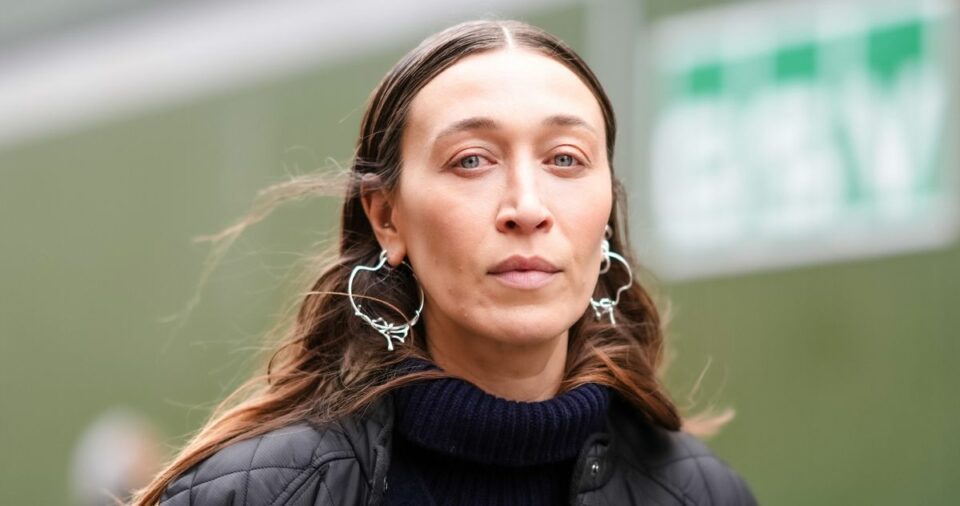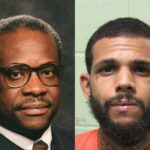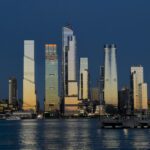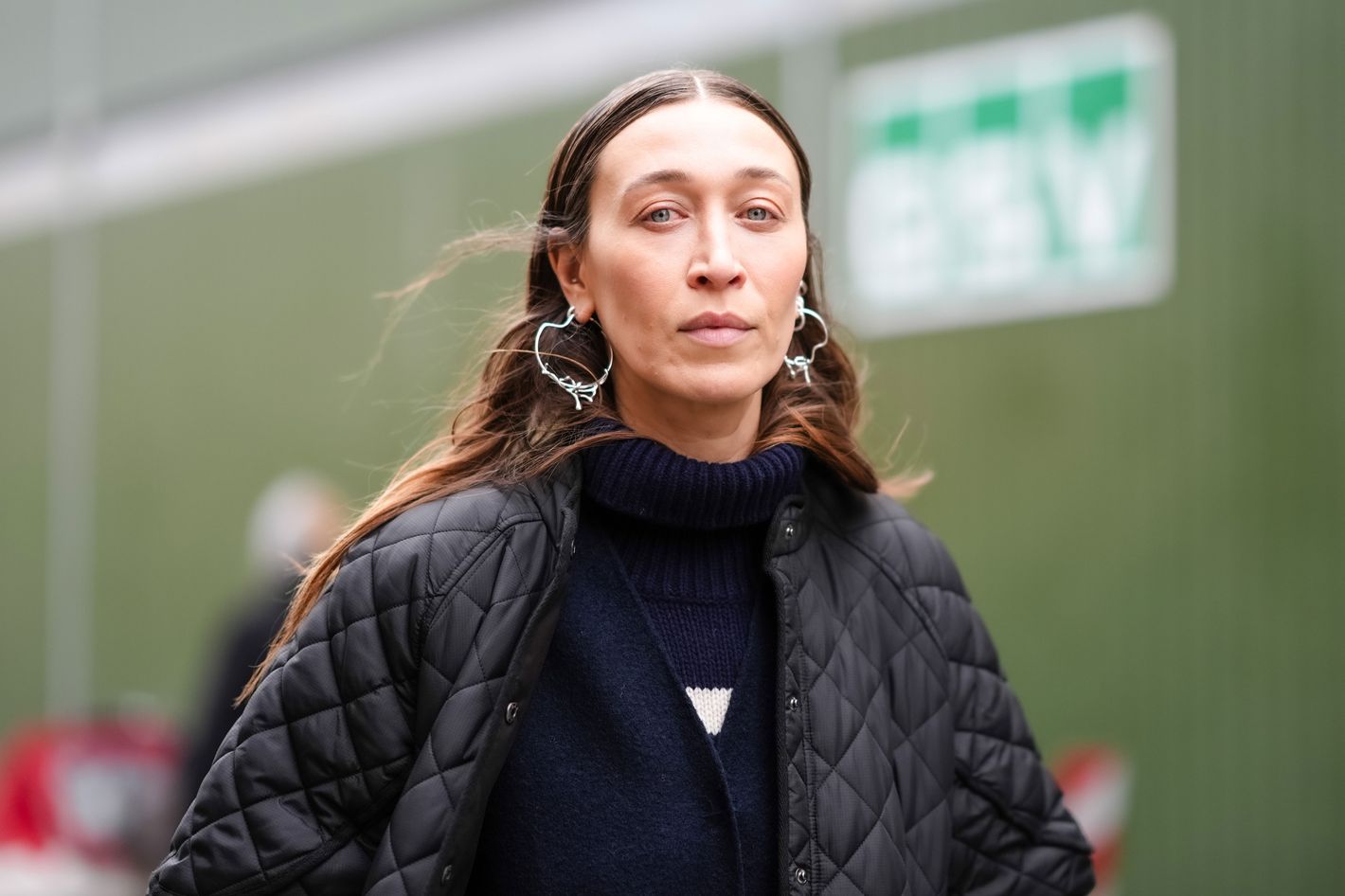
For the past half-decade, Alana Hadid has worked as a stylist, designer and model for labels like Saks Potts and Elena Velez. But while the focal point of her work kept her primarily in Los Angeles, her heart was often in Palestine. Her father, the real-estate mogul Mohamed Hadid, and his family fled the country and their home in Safed in 1948, becoming refugees when he was just a newborn. Along with her famous sisters — Gigi and Bella Hadid — Alana has long used her platform to highlight Palestinian voices and draw attention to the ongoing crisis in Gaza. “We are changing the ways in which we are viewed,” Alana told me in a candid call last month. “We want to see Palestinians in the mainstream.”
While many Palestinians in the diaspora have flocked to support the prominent family, not all the responses from the public have been positive. “I’m never surprised by the vitriol — by the hatred,” Hadid said. Last year, her phone number was leaked online. “I just got a new freaking phone number and moved on,” she continued. “You’re not silencing me by trying to discredit me or telling me I’m ugly or something. If I’m the ugliest one in the hottest family in the world, I’ll take that.”
Hadid, 40, is now leaning even deeper into her activism and her Palestinian heritage, ensuring her platform becomes a bridge for her people through her new venture, Watermelon Pictures — a film-production-and-distribution company dedicated to telling and highlighting Palestinian stories. One of the first movies the label distributed, Walled Off, directed by Vin Arfuso and produced by Anwar Hadid, Pink Floyd’s Roger Waters, and Kweku Mandela, a grandson of Nelson Mandela’s, takes an in-depth look at the Banksy-financed and -designed Walled Off Hotel, which directly faces the West Bank separation wall in Bethlehem.
“I think the next chapter of this movement, of course, is the liberation of Palestine, but through these organizations and businesses that are fostering the future of our narrative, of our conversation, of our humanization, and of our prosperity,” Hadid, who serves as Watermelon’s creative director, said of the production firm. “We are not helpless. We are not needy. We are being put in a place of need and helplessness, and we deserve to be prosperous and proud.”
The Cut sat down with Alana to discuss her Palestinian-Irish heritage, her upbringing, and her dreams for Watermelon Pictures and beyond.
Can you tell me a little bit about Watermelon Pictures and how that idea for the production company came about?
My brother and Vin Arfuso made a documentary called “Walled Off.” Vin had told me they found distribution and introduced me to them, and they told me about their idea for a Palestinian-led production company. These two brothers have a distribution company they’ve been working on for decades, making a name for themselves. They had helped with distribution for a few Palestinian films and then they realized they wanted to do something bigger that was a touch point for creatives, and they told me about their idea for Watermelon Pictures. The words had hardly come out of their mouths when I asked, “Can I please do this with you?”
The entertainment industry has been dehumanizing Palestinians and Arabs for so long. I have friends who are actors and they could only get the role of the “terrorist” or the “taxi driver,” but never just the human, just the guy. I want to see a Palestinian romantic comedy. We want to see Palestinians in the mainstream.
What does your dream project look like for Watermelon Pictures?
An Oscar-worthy film that is Palestinian led, acted, produced, and directed. I want to be the Palestinian or Arab A24.
You’ve been a model, you’ve done design work, and now you’re working in production. What keeps drawing you to creative pursuits?
My father is a creative. His mind is that of an artist. My mom does interior design. My younger sisters are models and still are some of the most amazing artists, and my older sister, Marielle, she’ll just draw something and it’s beautiful. I think my brain functions that way. I always pull myself to where I can be creative because that’s where I feel like I’m doing the most for myself and — not to be ridiculous — for the world. That is my gift back to the world, I think: my ability to be creative.
You’re part of one of the most prominent Palestinian families in the U.S. You’re basically our version of a royal family. What’s it been like for you these past few months as the spotlight on you all has only grown more intense?
We say existence is resistance for a reason, because just in saying we’re Palestinian and being in the places that we are in the world and exposed to that many people and having people go “Palestinian? Where’s Palestine?” That is more education than they want anyone to have.
My sisters have millions and millions of followers, and just them saying they’re Palestinian is a huge act of activism. I know how that sounds, but the act of constantly reminding people that they’re Palestinian is super-important. So many people in this generation are aware of Palestine because they did that.
People love to attack us. However, every time someone says something about me or about my family, it only makes me louder. It only makes me want to say more.
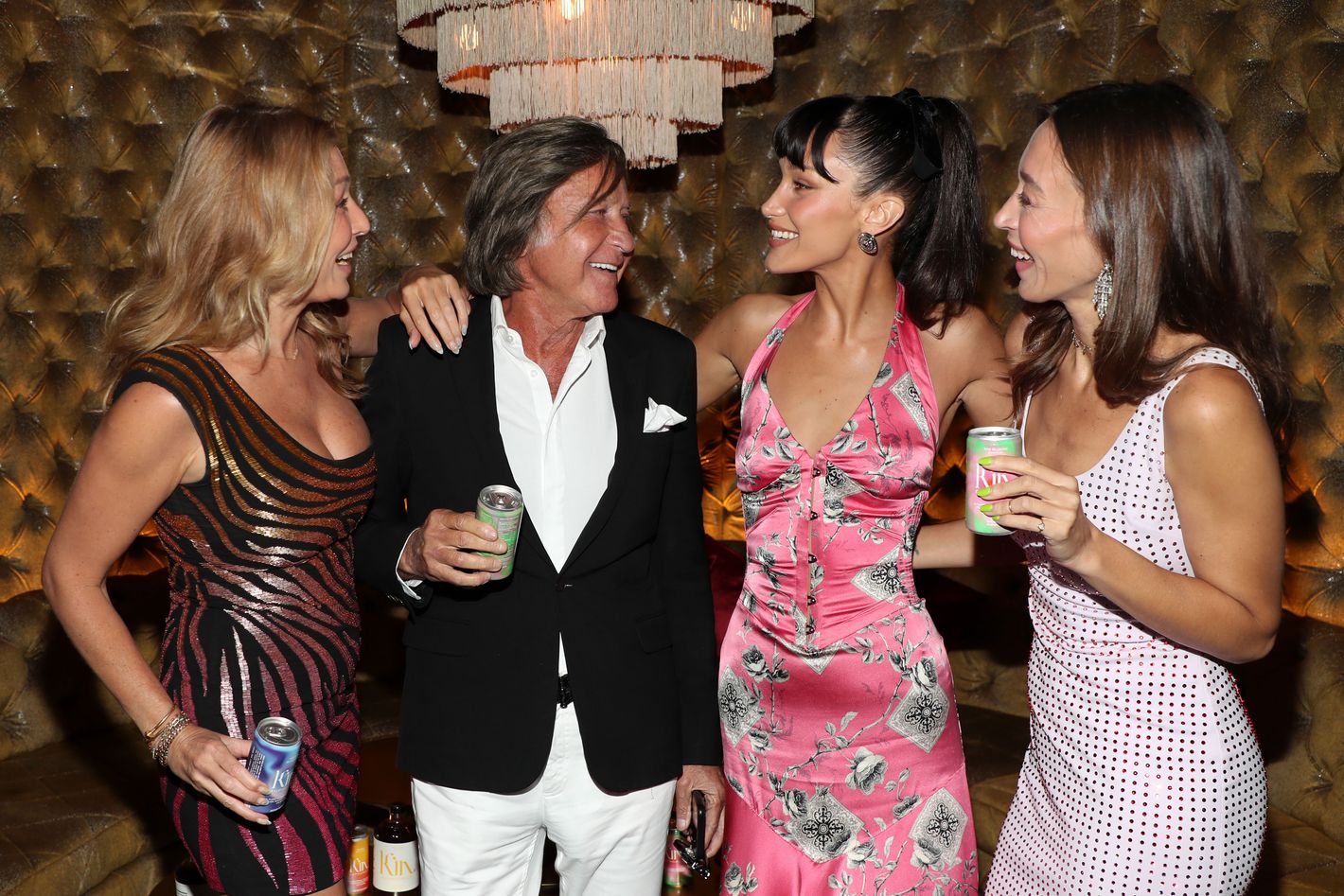
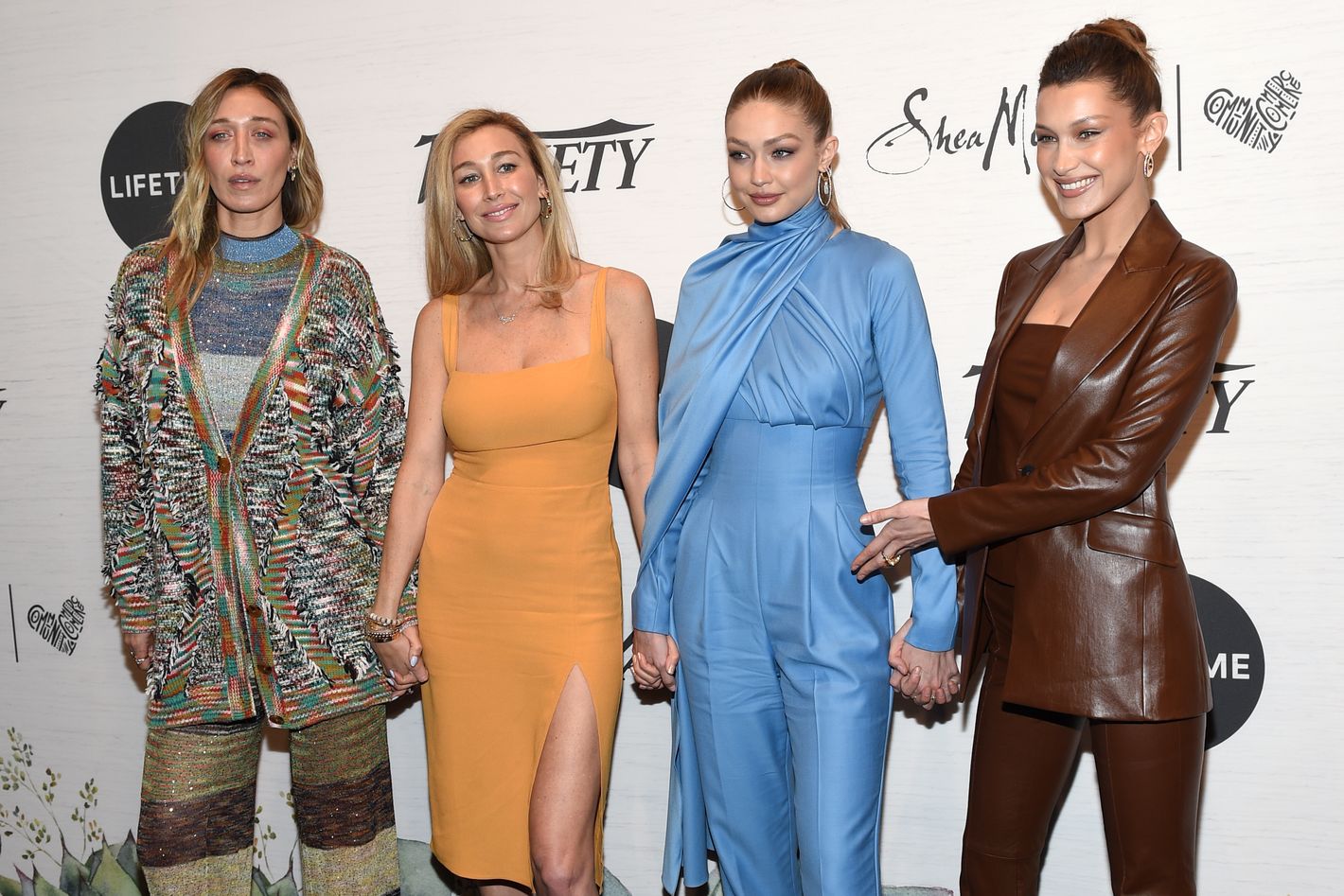
It seems like embracing your heritage, including your Irish side, is part of how you grew up.
As Irish people, my maternal grandparents were like, “What’s happening to the Palestinians is wrong. We know what occupation looks like.” So when my mom met my dad, it wasn’t like they had a taboo relationship. They come from this dual background of liberation.
I grew up in McLean, Virginia, and my dad built a neighborhood so all his family members could live together. His mother, whom we call Teta, lived at the end of the street, and all of her kids lived in the houses down the street. They re-created what they would’ve had in Palestine in Virginia. My cousins and I all got to play together and be together, and we would have dinner at my Teta’s house every night. I really was immersed in my culture as a child.
We’re a very vocal, very activist family. My Teta was very vocal. She was on Arabic TV all the time talking about her story.
People always think that I’m speaking about Palestine because I’m Palestinian, and yes, I am obviously, but I also have a bachelor’s degree in political science. I have a master’s degree in international relations. I’m speaking about it from a deep understanding of my heritage, but also a deep understanding of geopolitics and how we have been maligned.
Do you have a singular memory that you feel shaped you as an adult today, from either your adolescence or childhood?
My Teta’s passing. She had Alzheimer’s when she died, and she just spoke about going home to Palestine. Even though I was a teenager, I don’t think I fully conceptualized the fact that she couldn’t go home. When my grandmother was just talking about going home — “I just want to go home. Am I home? I want to be home” — I think that really hit me, and it made me have a deeper understanding of her pain and how this is one of the worst things that you can do to a person: not allow them to return home or to live and die in the place they were born.
How do you keep in touch with both of your cultures?
I think by fighting for the liberation of Palestine, I’m quite literally honoring my Irish side. I think my daily practice of doing that is in honor of it. It is honoring my mother and my ancestors because that is exactly what they went through and want no one else to have to go through. I think it’s so poignant in some way that I come from a liberated people and an oppressed people. Intrinsically in my DNA, I know what it feels like to be able to find liberation and also not to have it.
I am 40 years old. I feel like I’m just getting here now. I dated an anti-Zionist Jew who lived in Israel. Spending time there and seeing with my own eyes and feeling the apartheid was a huge wake-up call for me. I don’t have any affiliation with him anymore, but I utilized that privilege so that I was able to spend time with my family in the West Bank, to travel to Nazareth, to go to Safed, which my father had never seen in his life, even though it is the place where his ancestors are from and where he would’ve lived if his family weren’t violently expelled. As an American who was also a Palestinian, I was a second-class citizen the minute I walked into that country. I was strip-searched every single time I left the country. Every single time I went there I was interrogated for multiple hours, even though I had been there before. They ask you questions they already know the answer to: Who’s your grandfather? What’s his last name? Where was he born?
I always say to Americans, “Go.” You really need to go and experience this for yourself. You need to go to the West Bank. You need to go through checkpoints. You need to know what that looks like and feels like.
As the crisis in Gaza gets worse and worse, how do you keep doing the work? How do you keep putting one foot in front of the other and creating?
It is hard. It is a struggle. I am not trying to center myself. People are dying and being targeted and murdered. But what keeps me going every day is my friends who are still living in Gaza, who are under bombardment, siege, famine, who are living amid targeted killing and indiscriminate murder. They need people in safe places not just to be their voices but to be their bullhorn. Social media isn’t for everyone, and it’s not necessarily how everyone should be speaking to the world, but everyone should be working toward this in educating themselves and others because there are people who literally are being silenced by death. And so how can we be silent while that’s happening, and how can we live with ourselves?
I’m exhausted. I don’t know where it comes from. I think in this cosmic way, sometimes, I get energy from my ancestors and they’re like, “You’ve got to do this.”
You strike me as somebody who is so sure of who they are and so steadfast in their beliefs and how they see the world. What are some things you are sure of right now?
I am sure that Palestine will be free. I am sure that we are going to have collective liberation. I’m sure that I will do everything that I can to get us there. I’m also sure of the fact that I want to be able to be a whole human as a Palestinian and Irish person. I want to be able to experience all the things that I’ve been able to experience and do all the things that I love doing while being an activist and open about who I am and what I’m doing. I’m sure that we are going to, as a people, be able to get to a place where it’s just going to be normal to tell someone that you’re Palestinian.
Danya Issawi , 2024-06-11 21:08:55
Source link
